
Reliance ADAG wants to become a global media and entertainment house. It is diversifying its services for stability and investing in Hollywood to reach scale.
Call it foresight or sheer good luck. The Reliance Anil Dhirubhai Ambani Group (Reliance ADAG) had bought the distribution rights of 3 Idiots for Rs 80 crore (Rs 800 million).
The Aamir Khan film, which dwells on the travails of three friends in an engineering college, smashed all records and has till date done collections of over Rs 400 crore (Rs 4 billion) in India and abroad. No businessman worth his calculator can ask for a better return on investment.
But Reliance ADAG knows that success of this kind is rare and happens only once in a lifetime.
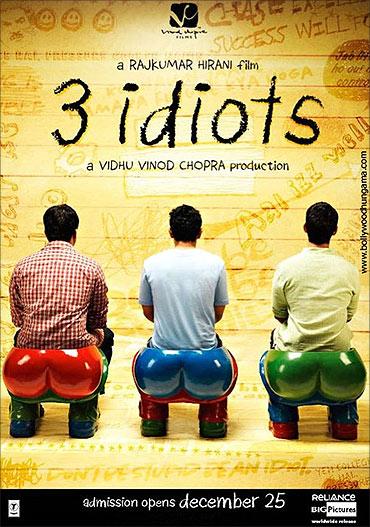
The movie and entertainment business, which depends solely on the taste and mood swings of fickle audiences, is full of glorious uncertainties.
Before 3 Idiots, Reliance ADAG has sunk large piles of money in films like Do Knot Disturb that did not make any noise at the box office.
Prudence, therefore, demands that the group should have a presence in areas other than production and distribution if it wants steady revenue streams, with predictable earnings and growth.
That is a natural hedge against the unpredictable and volatile, though glamorous, part of the movie business.
That is the reason Reliance ADAG now offers the whole suite of services to a film production house - cameras on hire, studios, processing facilities, post-production services and even theatres to show the movie.
Such services, say Reliance ADAG executives, add up to about 45 per cent of the cost of a film (35 per cent is spent on actors, another 20 per cent or so on marketing).
And it is this business -- stable, though behind the scene -- that the group has trained its sights on.
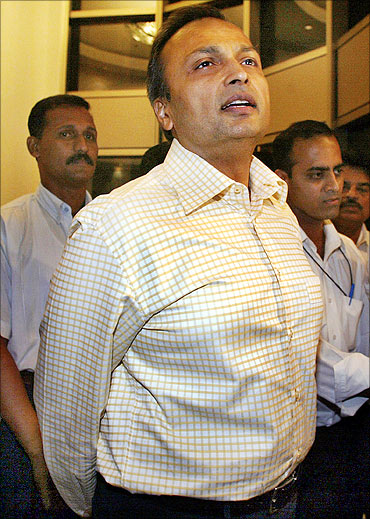
The person Anil Ambani, the chairman of the group, has chosen to mastermind the movie business strategy is none other but his trusted financial aide, Amitabh Jhunjhunwala, who is now the vice-chairman of Reliance Capital.
This, observers say, shows the importance Ambani attaches to this business. The diversification is Jhunjhunwala's brainchild.
"It's a two-pronged strategy. The media services and exhibition businesses provide us stable and predictable revenues and income, growing at around 25-30 per cent a year.
The other part is the content business, where the potential for value creation is disproportionately higher. We are following a portfolio approach to manage consistent growth," Jhunjhunwala explains.

The jury is still out if it will be a good hedge against the uncertainties of production and distribution.
The services are more in the nature of a labour arbitrage, say some observers, and Reliance ADAG doesn't have a USP (unique selling proposition) or differentiator.
That perhaps is the reason the group wants to take the business to a level and scale no other Indian has thought of - Hollywood.
It has begun to offer various services to Hollywood studios, set up a chain of theatres in the United States and, most ambitious of all, wants to have a large roster of films under production.
A few months ago, it made an audacious bid to buy out MGM -- the iconic Hollywood studio that has a library of over 4,000 top movies, including the entire James Bond and Pink Panther series.
The company is tightlipped on the deal, but it is common knowledge that it is one of the suitors for the cash-strapped studio.
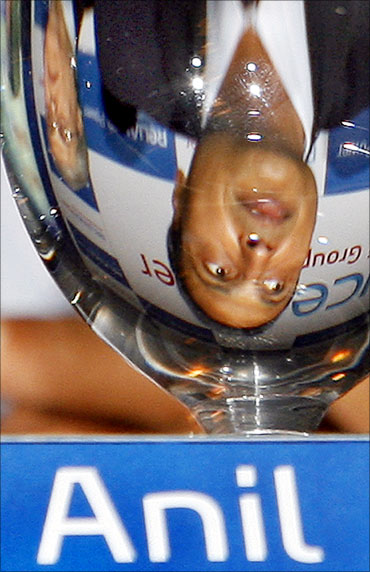
Size does matter
Reliance ADAG, of course, is not the first Indian company to offer its services to Hollywood studios. This is an opportunity others have spotted and already begun to exploit.
For instance, Mumbai-based Prime Focus worked on some of the special effects for James Cameron's Avatar. But their numbers are small.
Moreover, none has the scale and financial muscle of Reliance ADAG.
The opportunities are huge, for sure. The first advantage is access.
In just four hours, a production house based in Hollywood can now transfer an entire movie through a dedicated high-speed fibre optic line built by Reliance Communications from Los Angeles to Mumbai.
The line, it appears, is in good use.
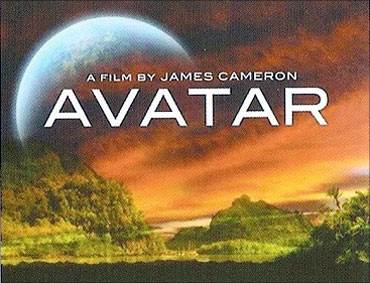
In Airoli, a suburb of Mumbai, over 1,500 experts work round the clock in a facility owned by Reliance ADAG to restore old Hollywood films to digital quality.
The group has also tied up with US-based In-Three which specialises in the conversion of two-dimensional films into three-dimensional films.
In fact, three-dimensional films have become quite a rage in markets overseas after the huge success of Avatar.
Much of this work could come to the Airoli facility of Reliance ADAG. "It is big business. The worldwide digital services business is worth $3 billion.
And we have a 50 per cent advantage in price. It needs about 300 people over three months to restore a film, which makes it a combination of artistic skill and scale.
What we are creating is a facility with over 2,500 employees, which can work on 10 films simultaneously," says RelianceMediaWorks CEO Anil Arjun.
The company was set up to look after Reliance ADAG's movie service business.
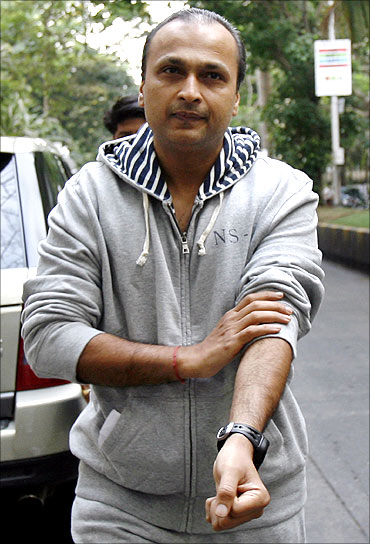
Another element of the Reliance ADAG strategy is to own a theatre chain in the US.
With over 180 screens in the US, mostly located in cities with a sizeable Indian and Asian population, this actually has nothing to do with Hollywood films.
Arjun says that Hindi films were being shown mostly in single-screen old cinema halls, which is not the place where young people want to see films - they prefer to go to glitzy multiplexes.
That is why the penetration of Hindi movies amongst non-resident Indians in the US was as low as 8 per cent. So, Reliance ADAG bought theatres and refurbished them to top standards.
When 3 Idiots hit the screens, the penetration shot up to 18 per cent!
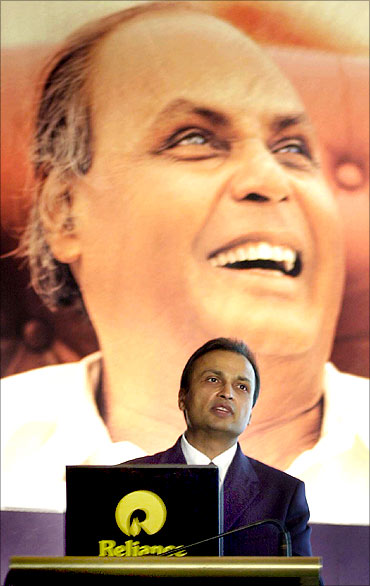
High stakes
A far bigger gamble is the production of Hollywood films. Nothing it may have done in India can prepare Reliance ADAG for the scale of things in Hollywood.
Jhunjhunwala is only too aware of it.
"The long-term potential of the Indian market is unmatched given our entertainment-crazy population of a billion plus.
On the other hand, our partnerships in Hollywood provide us immediate scale, global reach and access to world-class creative talent and processes," he says.
The budgets of Bollywood movies pale into insignificance when compared to Hollywood blockbusters.
For instance, while the most expensive movie in Bollywood, according
to industry experts, is Kites from Reliance ADAG with a budget of Rs 100 crore (Rs 1 billion), Avatar cost $300 million or Rs 1,500 crore (Rs 15 billion) to make!
The money involved is big, the stakes are huge.
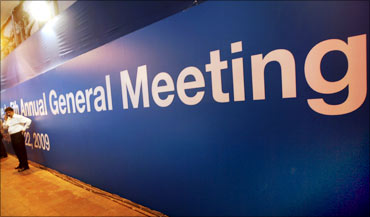
That's why hardly any Indian has financed Hollywood blockbusters, except perhaps ex-tennis star Vijay Amritraj who makes small-budget movies.
This doesn't seem to bother Reliance ADAG much. It has quietly put over $1 billion in the business, and has a war chest of $500 million for the next few years.
This, it hopes, will ensure that it has a place in the world of global entertainment, especially at a time when film producers are finding money hard to come by.
In Hollywood, a decent film can set the producer back by $40 million to $200 million.
So how does Reliance ADAG plan to crack this new world dominated by big studios, maverick film makers and also independent yet successful film production houses?
Reliance ADAG has signed 'developmental deals' with virtually all the top movie stars and directors of Hollywood like Brad Pitt, Julia Roberts, Tom Hanks and George Clooney.
All told, the group, according to industry sources, will have to put in between $25 million and $50 million on ten such deals.
Each partner will develop themes for a movie, some of which will be converted into scripts, and a few of them will be made into full-blown movies by Reliance ADAG.

But it's a tough world. Industry experts say that the failure rate of such developmental contracts is sometimes as high as 90 per cent.
This means that of the 10 such projects that Reliance ADAG has taken up, there is a fair chance that only one might get made into a film.
In other words, the group could end up sinking million of dollars before the first film goes on the floor.
But Jhunjhunwala is hopeful that Reliance ADAG's luck will be better, and it will have at least one or two movies on the table by this year.
That, he says, is because the group has chosen actors who also have their own production houses, so they have a vested interest in throwing up good ideas.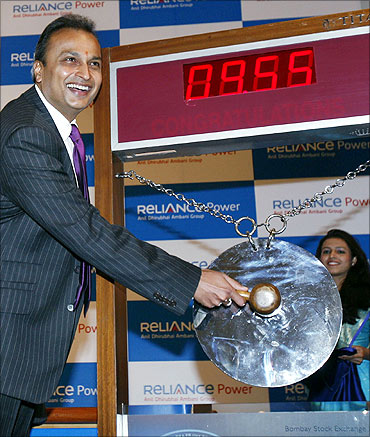
Dreams at work
Before that, the wheels could begin to move elsewhere. Reliance ADAG pulled off a coup of sorts last year when it got into a partnership with Steven Spielberg's DreamWorks.
Reliance ADAG will invest over $825 million in equity as well as debt to finance films in the 50-50 venture, while the distribution will be undertaken by Disney.
The deal is to finance about five films a year.
Reliance ADAG will have to be careful here. It is hardly a cakewalk.
Several Korean and Japanese investors have burnt their fingers when they collaborated with well-known filmmakers or Hollywood studios.
They sunk millions of dollars in their attempt to finance Hollywood's maverick and sometimes unreasonable movie makers.
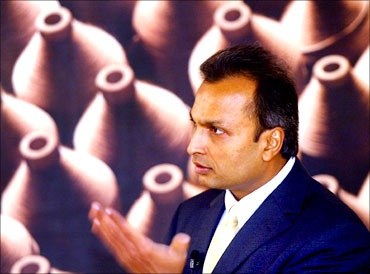
Jhunjhunwala says Reliance ADAG has learnt from these failures and has gone about it in a different way.
One, it is partnering only with the very top names in Hollywood, and two, it is actively involved in all its projects, as opposed to being a mere financier.
So, the Spielberg joint venture has Jhunjhunwala and another Hollywood industry veteran, Alan Levine, representing Reliance on the board of directors.
The group thus has full knowledge of all projects in the pipeline, and all major decisions are taken jointly, while providing for adequate flexibility and creative space for talent.
Two, the financial meltdown has seen large funds move out of filmdom; this has moved the terms of the trade from the studios and filmmakers to financiers like Reliance
ADAG, and gives them the space to carry out better due diligence on projects and proposals, ensuring a higher success rate.
But will this grandiose strategy through which Reliance ADAG is looking to become a global media and entertainment house, more or less in lines with Hollywood studios, really work?
It is the first experiment of its kind in India, and its success or failure will determine whether or not this model can work for Indian companies at all.